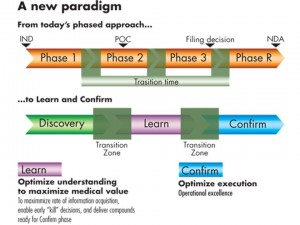The discovery of the unicist ontological structure of complex systems developed at The Unicist Research Institute provided the final input to develop a methodology for adaptive clinical trials. The unicist ontology of health that was discovered provided the basic background for this methodology: http://goo.gl/Ruwsr3
 This approach is based on the integration of aspects of traditional clinical trials, the concept of the “learn and confirm” standard and the unicist approach to complexity sciences.
This approach is based on the integration of aspects of traditional clinical trials, the concept of the “learn and confirm” standard and the unicist approach to complexity sciences.
This approach is based on the use of destructive tests, which are a special kind of falsification test (Karl Popper), to sustain the Phase I and Phase II clinical trials.
The objective of destructive tests is to confirm the limits of the functionality that is being tested.
They are necessary in the previous research work but their application in these phases allows providing a safe input to develop the following phases. Destructive tests are based on universal experimenting and on the knowledge of the conceptual foundations of what is being researched.
 Phase III and IV are approaches that use non destructive tests that are analogous to the traditional clinical trials but with the inclusion of a quality assurance process that triggers a “learning” process when predefined limits are exceeded.
Phase III and IV are approaches that use non destructive tests that are analogous to the traditional clinical trials but with the inclusion of a quality assurance process that triggers a “learning” process when predefined limits are exceeded.
The “learn & confirm” methodology introduced at Wyeth changed the paradigms of clinical trials and introduced a conceptual simplification in the R&D processes that could not expand massively because of the non-evident economic benefits of this technology.
The unicist approach to adaptive clinical trials is an approach based on the complexity science research methodology developed at The Unicist Research Institute that simplified the discovery-learn-confirm method introduced by Wyeth and provides a secure approach to life-sciences.
A research consortium, coordinated by Peter Belohlavek, is being organized to develop this solution in real application fields. It is expected that this methodology becomes a standard within the next two years based on the shortening of the R&D processes and the saving of up to 50% of the costs.
Learn more about “What are complexity sciences” at:
http://www.unicist.org/repo/#Unicist
Unicist Press Committee
NOTE: The Unicist Research Institute was the pioneer in using the unicist logical approach in complexity science research and became a private global decentralized leading research organization in the field of human adaptive systems. It has an academic arm and a business arm.
https://www.unicist.org/healthcare/wp-content/uploads/2014/10/turi.pdf

